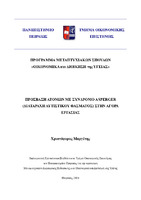Πρόσβαση ατόμων με σύνδρομο Asperger (διαταραχή αυτιστικού φάσματος) στην αγορά εργασίας
Access to the labour market for people with Asperger syndrome (autism spectrum disorder)

View/
Keywords
Διαταραχή αυτιστικού φάσματος ; Υψηλή λειτουργικότητα ; Εργοδότες ; Εργαζόμενοι ; Προκατάληψη ; Εμπόδια στην πρόσληψη ; Κυβερνητικοί φορείς ; Ιδιωτικοί φορείς ; Ανεργία ; Αποτελέσματα πολιτικών απασχόλησηςAbstract
When people with Autism Spectrum Disorder (ASD) wish to find a job and want to remain in a working environment, this usually causes unbearable stress and often a very painful sentiment. Moreover these people face huge unemployment rates. People with highly functioning Autism Spectrum Disorder (ASD) have better chances to be employed, because they acquire skills in mathematics, calculation and attention to details and so they thrive in fields of IT, automation and Data Analysis. This needs to be educated in early years with targeted vocational and educational training.
Many companies and directors have usually bigotry against ASD people, because these people lack of social and managerial skills and is difficult to adapt in a demanding working place. Nevertheless many companies in the past years have start hiring more and more of these people.
The contribution of intermediary government and non-government organizations in facilitation, vocational training, support and recruitment of ASD people worldwide is very crucial. Hiring those people is through the years more common, especially in high technology companies.
The results of these policies are not always encouraging, but is the first step of achieving the integration of ASD people into the labour market and eventually into the society more efficiently.
A large number of ASD people who want to enter the labour market have to overcome huge obstacles when trying to find work, when they pass the interview procedure, when they face negative social stereotypes, when they need to be confined at home and finally when they have to confront the collateral financial and psychological damages from all these situations. These challenges will be and have to be dealt in future intervention programs.
Finally the icon and the reflection of ASD people in social media, cinema and TV often reproduce negative stereotypes, but eventually increase understanding and improve the image of autistic people in the society.


